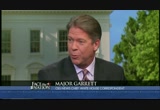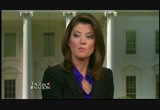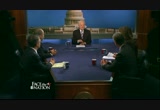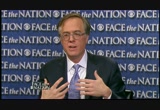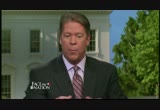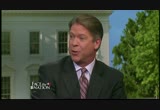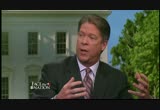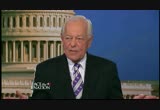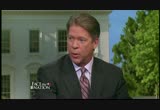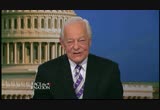tv Face the Nation CBS December 9, 2012 5:00pm-5:30pm PST
5:00 pm
no news, but i have a story and the story will have to substitute for news. i was conversing this morning, as i do every morning, with the white house about is anything going on? is anyone of importance talking to anyone else on capitol hill of%? and i was given the same nonresponsive answer i get daily "lines of communication are open." finally getting sick of that i said, look, the lines of communication were open during the cold war, too." and i thought that was an extravagant over-the-top comment. >> and the other side said, yes the cold war ended when one side realized they couldn't win. so i think we're on a cold war footing right now. >> schieffer: what do you think, joe? what's happening, anything? >> not all that much, but also, i think that this is-- this has been an over-hyped situation from the start. you know, we have a serious long-term deficit problem in this country. we don't have a long-term deficit crisis.
5:01 pm
i think that we're going to be able-- that they're going to make a deal. i mean, that's what politicians do. the republicans lost the election. they know they're going to have to raise revenues. but i think the over-hyping of deficits, the deficit mania that seized this town, is kind of crazy. i mean, i love alan simpson and erskine bowles, but they're talking about inflation at a moment when people are paying us money to invest in our treasury bonds. you know, the summer before last, when we had the debt ceiling negotiations, and everybody was saying oh, our credit is about to go down the tubes. the price of u.s. treasury bonds were going up. so the fact is that we have a problem. i'm hoping that we'll deal with it, especially, you know, the old age entitlementes, because sooner or later, you and i are going to be old enough to qualify for medicare, and we're going to at the present time to be a good system. but we i think a little
5:02 pm
rationality is called for. >> schieffer: you're saying it's not as bad as it seems. the fact of the matter swhen the bush tax cuts run out at the end of the year, when payroll tax-- whatever they call it, runs out at the end of the year, people's taxes are going to go up. they may not be a crisis for some of the upper income folk but if you're down the line there, that's a big deal. >> and i fully believe that's going to be taken care of. but if you remember, when the clinton tax cuts-- tax rates were imposed in 1993, martin felledsteen, you know, a very substantial economist, wrote an op-ed in the "with the journal" that day predicting we were going into a deep recession pause of the tax rates. we went into a big boom. we're tingering on the edges here of a massive economy. >> schieffer: michael? >> everybody knows the conversation needs to take place. speaker boehner calling the president saying i'll give some on rates. you have to give some on
5:03 pm
structural eltitlement reforms. the problem is, it's the president who sets the groundwork for that discussion. and right now republicans think the president's undermining that possible conversation by an unreasonable first setef demands, procedural changes that would make them irrelevant. the art of the deal involves giving people a soft place to land. and right now, republicans aren't seeing a soft place to land. their only option is humiliation in this process, and they're increasingly thinking that the president sees victory at the bottom of the fiscal cliff. >> but remember where we were when we last had this debate between the speaker and the president and the president and the white house feels like they were humiliated by speaker boehner when he wouldn't return his own phone calls. that's part of what's going on here is the lack of trust. but, look, as soon as what president obama wants is speaker boehner say he's going to give on the tax rates. as soon as that happens it will unlock everything else. the white house says boehner knows they will be willing to
5:04 pm
make structural reform to entitlements and take on his own party on that matter, but they want that concession from boehner about the rates. and you saw boehner walk right up to the line on friday by suggesting maybe it could go from 35 to 37 or give a little bit. they tried to walk that back. as soon as that conservation happens, that will unlock everything. >> schieffer: can speaker boehner deliver the votes in his caucus if in fact he makes a deal? >> i don't think he that's say it. high doesn't have to say it out loud. s that's thing. he needs to signal it in some way and then you'll have a two-stage process. they'll do the fiscal cliff stuff and tax reform by august 1 of next year. >> but the speaker so far has not had a rebellion underneath him. he has said things that continue to move in this direction without a rebellion. here's what happened oned with. the president called speaker boehner, my congressional add aides are going to meet with your people. what ron neighbors said tell us what you want after you agree to rates. the white house thought that was an accommodating conversation.
5:05 pm
the republicans interpreted that as seeking their humiliation. so even within the contours of conversations that are direct and face to face, there are wildly differing interpretations. >> republicans, by the way, know if boehner crosses that bridge, that it could be immediately leaped and get a democratic victory dance on rates without really getting serious on the other side. that's what the lack of trust causes in this process. >> schieffer: i guess in the final analysis, nothing is going to happen until the last minute of the last hour, though, it seems to me. >> and the closer we get to that, the smaller this becomes. by definition. you have to ride it small. it can only be digested quickly. the longer we wait and the closer we get the smaller the scope of the deal is. >> schieffer: i want to-- we can get back to this-- i want to ask you about some of the other things that happened this week. this idea that jim demint, who was the conservative, the tea party hero, as it were, announce
5:06 pm
he's not even going to finish out his term as the senator from south carolina. he's going to take a job at the heritage foundation. michael what, do you think, as a conservative, what are the implications of this? >> well, he was always more of an activist than a legislator. his colleagues sometimes resented him because he supported primary opponents against them. maybe of his republican senate colleagues resented that. but i think this is mainly a problem for the conservative movement and conservative think tank. republicans are going to have to enter a period right now of rethinking on major issues, on immigration, on economic policy, on social mobility. and the heritage foundation is one of those major think tanks is turning to someone who is not particularly inclined to this process. the tea party hero, somebody that's intolerant of dissent when it comes these issues. i think that's a very bad sign for the conservative movement. they need something that they seem to be turning away from in key ways.
5:07 pm
>> well, one other thing that struck me about it, bob, this move signals that one of the political elements will of the heritage foundation may be enlarging its focus. heritage fund for america, which is a political arm of a think tank. now, that hasn't been there before. the center for american politics on left has both, a think tank and a political arm. now heritage is beefing up the political side of its think tankery. that seems a structural difference in washington, one that makes conservatism not just about ideas and the conaccept the of thinking about government but putting a political agitating force beside it. it may not be good for the conservative movement but it is a change. >>ic it's sad. i remember heritage is where obamacare came from. the idea of an individual mandate came from student butler from the merge heritage foundation. we're at the moment where interesting thinking is happening among younger conservativees, on a lot of the social issues bedelving us, like
5:08 pm
health care. i don't know that jim demint is all that interested in that kind of stuff. >> schieffer: what about, norah, the republican party in general? where does it go from here? it got beat when all the indicators suggested they should have won this election, if you just went by the economic indicatores, and all of that, and yet, president obama won. >> well, look at all the-- those who are leading the republican ticket, presumably, for 2016, whether it's rubio, ryan, jeb bush, all of them acknowledge that the party has got to change to some degree, and especially rubio and bush, conditionalling the need to attack on issues like immigration, to speak to middle class voters. there is an acknowledgment they will change, and bobby jindal as well. the question is whether the congress will be able to go along and present some legislative victories. certainly, the republican governors are proud of their work in the state. but in terms of congress, so we'll see. immigration reform, once they get through the fiscal cliff, by
5:09 pm
all wantch objects there could be movement on that in the new year. >> schieffer: all right. we're going to take a break right here and when we come back we'll talk about all this and some other stuff going on in washington. twins. i didn't see them coming. i have obligations. cute obligations, but obligations. i need to rethink the core of my portfolio. what i really need is sleep. introducing the ishares core, building blocks for the heart of your portfolio. find out why 9 out of 10 large professional investors choose ishares for their etfs. ishares by blackrock. call 1-800-ishares for a prospectus which includes investment objectives, risks, charges and expenses. read and consider it carefully before investing. risk includes possible loss of principal.
5:10 pm
>> schieffer: we're back now with our panel. joe klein, let's get back to something else that happened this week in the senate that shows this is kind of a different place than it once was and i talked about this in my commentary. this is turning down the treato disabilities, which really didn't have all that much impact in this country but it just called on other countries to provide the access and the nondiscrimination that the disabled have. >> it was an outsourcing of american values to the rest of the world. >> schieffer: yes. >> but interesting thing to me about that vote -- and it goes back to what we were talking about before with the future of the republican party-- it wasn't
5:11 pm
just hard-line conservatives who voted against this. yet, people who were moderates, like saxby chambliss, who talked about raising ref news, and lamar alexander from tennessee, and lindsey graham, who is often a moderate on issuees, been a moderate on climate change-- all three of them voted against this treaty. why? because all three of them are likely to face tea party primaries in 2014. and i think that, that-- you know, that bloodbath hasn't ended within the republican party. we're going to see at least another cycle of it. >> schieffer: let's talk about the more immediate things, and that is the next obama administration. one of the things that strikes me, and you brought it up in the green room a while ago, joe, we have not seen the administration nominate anybody. >> anybody. >> schieffer: to any office here. we're a month into-- after the election, and we've had all the controversy over susan rice, and who know where's tha that is?
5:12 pm
what's happening? what's going on here? >> well, the administration is, as it says, studying all its options. what it's trying to figure out a way if in fact it wants to make the susan rice fight which is visually going to be a difficult fight, and if it does, how hard will it fight and how far is it willing to push? there are those who argue, look, if you put cbs news rice in the national security council and i will put senator kennedy up-- >> kerry. >> senator kerry from the senate up to nominate for secretary of state. the problem with that is tom donnell and the existing national security adviser doesn't want to leave and has no intention of going. that's complicated math inside the white house, and for the administration. all the other positions, the thought is, jacques lugar goes to treasury, to replace secretary geithner, but who would replace him as chief of staff. >> tom donelan. >> the final decisions haven't been made and there are a lot of pieces on the chess board. >> schieffer: is this because of the fiskal cliff thing that is gog that they haven't focused on who is going to serve? >> they don't want to pick a fight with capitol hill.
5:13 pm
it will be something they have to deal with because people want to leave in the new term. and certainly, secretary of state hillary which the has long signaled she is only going to serve one term as secretary of state. and we see on the front page of the "new york times" today a big piece by jody kantor, what is next for hillary clinton, and whether she is a front-runner in 2016. the "washington post" had a poll nashows hillary's favorability is atap all-time high. they're going to have to start putting some names out there. >> schieffer: do you think she'll run, michael? >> i think she would have a consider support of the party. i think she has a history of being interested. i think there's a lot to commend this, as a prospect. but i do think on the previous point that the preoccupation with the fiscal as soon as just dominating everything else. and, you know, the stakes are high for the president. if he got in a plan for long-term fiscal constraint and
5:14 pm
did immigration, these would be some large, historical achievementes, things that any president of the united states would be proud of. if the system collapses, and we can't achieve category because of politics, that's it going to be a tremendously bad start for his term. the stakes are high for him >> and it would cast a shadow on the remainder of the second term and his legacy would be of partisanship. health care and the financial reform were largely democratic. there would be no large, structural, bipartisan efforts by this white house. >> it wouldn't abe picnic for the republicans. they're going to get blamed per of for this. when i go out in the country and i spend a lot of time out there, people are just sick of these kind of games. they just want to see it get done. and i think that-- i mean, there's an outline that's there, that's pretty obvious about where we have to go. the president has proposed $1.6 trillion, the republicans have proposed $800 billion.
5:15 pm
1.2 trillion is right in the middle. ( laughter ) and we all know that the health care system has to be addressed. there are ways to do it. some of which paul ryan suggested. you know, ryan's plan for medicare is exactly the same as obamacare. i mean, if people would just stop being so oppositional. and sat down and make the kind of deal you were talking about before. it was interesting to see bob dole on the floor, and george h.w. bush in the-- in hospital this week. these were giants. that was a republican party that came up with a lot of really creative ideas and got things done. >> schieffer: well, you know, this used to be-- and maybe it's things always look larger in the rearview mirror. most of the time they look smaller in the rearview mirror in reality. but it seems here, they look larger in the rearview mirror. and you just wonder has-- has this generation of politicians
5:16 pm
simply forgoalpost ho forgotten how to negotiate, forgoalpost how to get things done? in the age of the new media is it impossible to do things the way you do them. that is you have friends across party lines. and you talk after work, and you work out things. you find out who needs what. now, nobody seems to know anybody. nobody seems to know what the other guy needs. they put out these tweets. they put out these press releases. they put out these photo opportunities, but shoe or another they never get around talking to one another. >> the idea is positioning presages an outcome. if you win the positioning battle eventually you get to governing. when i got to washington in 1990, not as early about some of us at the table, people were about governing first and positions our way to the governing outcome. now if you position yourself maybe you can goch without the underlying assumption we're going to govern and ultimately
5:17 pm
will get something done. >> and the budget's a particular problem because if democrats get what they want-- tax increases on the wealthy-- they can crow about it in public. if republicans get what they want, which is structural changes in medicare, they it are doing this for fiscal reasons. that means this entitlement reform never gets done unless the profit united states gives cover to people and says we're going to all jump together. and that is what i think republicans are questioning whether that's-- >> he's on the record. he was willing to do that in negotiations with boehner in 2011. he's willing to even think about raising the age of eligibility for medicare. he was willing, if the republicans would have played on obamacare, to give them malpractice reform. >> he's not leading on it. >> well, i mean, you know, he's no, on it. and i think that every time the president makes an initial proposal, republicans squeal and
5:18 pm
say it's of-- it's negotiating. and i think that negotiation is going on now. and if they're smart-- i know this is a real leap if of when it comes to this congress-- if they're smart, they'll get it done in the next week. >> schieffer: major, all the problems are not here at home. there are pretty big ones building overseas. this whole syria mess. ones where this thing is going. what's the latest on that. >> the feeling in the administration is they're gathering intelligence information on an hourly basis to try to figure out what's happening to the stockpiles of chemical weapons. with they being mixed, moved, is there anything of dire immediate consequence about that? there is a report in the "sunday london time "there is a convert operation to take arms from libya. the united states is okay with that, to give it to the opposition. the position of the u.s. government has not changed. they will not directly or indirectly arm the opposition in libya or anywhere else. the sense is, this is on an hour-to-hour basis and the
5:19 pm
immediate danger for not only the syrian civilians but the fate of the assad government is a top concern for the administration. >> schieffer: as tragic as all this is, isn't the real problem knowing who to aid? i mean, we say we want to aid those that are opposing assad, but we don't know who some of these people are. some of them we know where al qaeda. >> right. that has long been the white house worry about arming the different opposition groups, some who are al qaeda. i think what we're seeing here is the president laid out-- he said any moving of chemical weapons would be a red line. if they're moving chemical weapons are we at the red line for the president? his rhetoric shaved both the this issue in terms of when the u.s. will engage. the bright spot for this administration on syria is secretary of state hillary clinton meeting with the russian foreign minister, and it look likes will the russians are willing to move. and the ultimate outcome, bob, is not going to be military involvement. it's going to be getting the russians to get assad out of there. >> syria is different from any
5:20 pm
of these other problems we've had in the middle east because 95 year ago or so, a bunch of europeans drew straight-lean borders until sand in the middle east and called them countries. they're not really countries. when assad goes, as he probably will, there are kurds up in the north there are sunnis who might want to join with the sunnies in iraq. and i think that we're comes to a very, very difficult period in the middle east, far more difficult than last couple of years because we're going to see whether these countries actually are countries. >> schieffer: and isn't one of the real problems here, michael, is when we talk about these chemical weapons, maybe not so much that assad might use those on his own people but somehow in this chaos, that al qaeda, some of these other people, might get control of one of these things. >> but this is one of the concerns. the critics of administration policy on this say we evaporate beewe haven't been active enough and all that's results
5:21 pm
would happen-- you would have destabilization of the secretion humanitarian problems. they have all happened. the fact that america wasn't more engaged earlier and actively in this process i think was probably a mistake. >> we can't assume that western powers like the united states any more in an age of twitter and facebook and all the rest are going to be able to dictate results in these countries once again. i think that our diplomacy could be a little bit more subtle-- supple, but i really think that these people are going to have to make decisions about who they are and what countries they want to have. >> schieffer: i'll tell you one thing strikes me, i think all of us are going to be able to find work over the next 12 months. i think there's going to be plenty of thanks-- >> speaking for mierkz bob, that's very good news. >> schieffer: i guess there is some bright side to these clouds of doom that we see. well, i want to thank all of you for coming by this morning. it's a lot of fun to go over some of this stuff.
5:22 pm
5:24 pm
>> schieffer: finally for our "face the nation" flash back today we didn't have to flash very far back. just a couple of nights last week because the fiscal cliff had the comics on a roll. >> we have good news and we have bad news! first, the bad news, it is just tweet days until the fiscal cliff deadline. the good news, only 17 days the mayans say we're all going to die so who cares about the fiscal cliff! exactly. >> we would like to announce we have reached an agreement to avoid a fiscal cliff. in order to get the support of the speaker, i agree there will be no tax increases. i repeat, zero tax increases. now, why would i do that? i mean, i won the election. ( laughter ) i have the leverage. why give in? well, simply put-- i felt sorry for this man. >> is there a prospect for a
5:25 pm
deal? >> there's not a prospect for a deal. >> of course! it. >> the ongoing talks. >> there aren't even very many talks going on. ( laughter ) >> you're kidding us! give us something! >> but for the first time, there are numbers on pieces of paper from both sides. >> numbers on paper! ( cheers and applause ) ( laughter ) >> schieffer: that is our "face the nation" flashback. one note to major garrett. major, i was here 10 years before people thought i was important enough, and you are off to a fine start. >> thank you, bob, thank you very much. bp has paid over twenty-three billion dollars to help those affected and to cover cleanup costs. today, the beaches and gulf are open, and many areas are reporting their best tourism seasons in years.
5:26 pm
5:27 pm
5:29 pm
again by t test in the arrest possibly cost himself an nfl career and some time in the penittary. >> the latest in the arrest with the player charged with killing a teammate in the alleged drunk driving crash. how the league is reacting? a popular south bay reaction. what one witness says could mean for future events. >> would be gat
184 Views
IN COLLECTIONS
KPIX (CBS) Television Archive
Television Archive  Television Archive News Search Service
Television Archive News Search Service  The Chin Grimes TV News Archive
The Chin Grimes TV News Archive 
Uploaded by TV Archive on

 Live Music Archive
Live Music Archive Librivox Free Audio
Librivox Free Audio Metropolitan Museum
Metropolitan Museum Cleveland Museum of Art
Cleveland Museum of Art Internet Arcade
Internet Arcade Console Living Room
Console Living Room Books to Borrow
Books to Borrow Open Library
Open Library TV News
TV News Understanding 9/11
Understanding 9/11